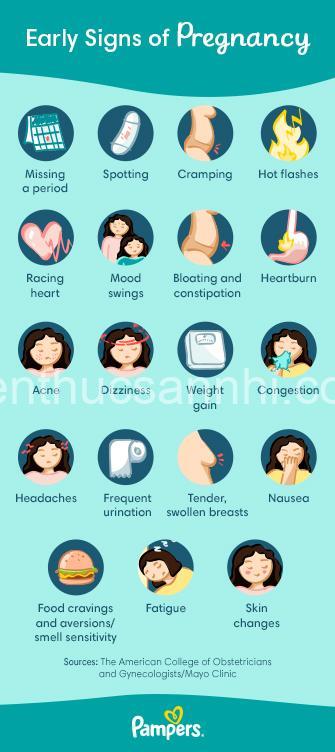
Healthy Pregnancy Signs: Normal Symptoms & Warning Signals. In today’s article, kienthucsannhi.com will explore with you in the most detailed and complete way. See now!
Understanding Normal Pregnancy Symptoms:
Pregnancy is a remarkable journey, marked by a wide range of physical and emotional changes. Understanding the normal signs and symptoms of a healthy pregnancy is crucial for both expectant mothers and their support system. This knowledge empowers you to navigate the journey with confidence, while staying vigilant for any potential warning signs.
Early Pregnancy Signs:
As the first trimester unfolds, your body begins to adapt to the presence of a growing baby. You might experience a whirlwind of changes, some familiar and others entirely new.
- Morning Sickness: This infamous symptom, often experienced during the first trimester, manifests as nausea and vomiting. While the term “morning” might be misleading, as nausea can occur anytime, it’s a common sign of pregnancy. The exact cause of morning sickness remains unknown, but hormonal changes and increased sensitivity to smells are believed to play a role. While it can be uncomfortable, morning sickness is generally considered a positive sign of a healthy pregnancy.
- Fatigue: You might find yourself feeling exhausted more often than usual during the early stages of pregnancy. This fatigue is attributed to hormonal changes, particularly the surge in progesterone, which helps prepare your body for pregnancy.
- Frequent Urination: The increased volume of blood circulating in your body during pregnancy leads to more frequent trips to the bathroom. As your baby grows, your uterus will put pressure on your bladder, further contributing to the need to urinate more often.
- Tender Breasts: As your body prepares for breastfeeding, your breasts will likely become tender and sensitive. Hormonal changes cause your breasts to enlarge, making them more sensitive to touch.
- Food Cravings and Aversions: Pregnancy hormones can wreak havoc on your taste buds, leading to intense food cravings and aversions. Suddenly, you might find yourself craving pickles and ice cream, or experiencing an aversion to foods you once loved.
- Constipation: Increased progesterone levels can slow down the digestive process, leading to constipation. You might find it challenging to have regular bowel movements.
- Mood Swings: Fluctuating hormone levels, particularly estrogen and progesterone, can cause mood swings during pregnancy. These swings can range from mild irritability to intense emotional highs and lows.
- Spotting or Light Bleeding: Implantation bleeding, a light spotting or bleeding that occurs around the time of a missed period, is a sign that the fertilized egg has successfully implanted in the uterine lining. While implantation bleeding is generally harmless, it’s essential to consult your healthcare provider if you experience any unusual vaginal bleeding.
- Increased Vaginal Discharge: Changes in vaginal discharge are common during pregnancy due to hormonal shifts. The discharge might become thicker and whiter. As long as the discharge is not foul-smelling, accompanied by itching, or accompanied by pain, it’s usually nothing to worry about.
- Elevated Basal Body Temperature: Your basal body temperature, the temperature taken upon waking, can remain elevated during early pregnancy. This is another indicator of the hormonal changes occurring within your body.
Mid-Pregnancy Signs:
As you enter the second trimester, the initial pregnancy symptoms often subside. However, new sensations and experiences emerge as your baby continues to grow.
- Fetal Movements: The first time you feel your baby move, known as quickening, is a magical moment. The timing of quickening can vary between women, usually occurring between weeks 16 and 25.
- Weight Gain: You will likely experience a gradual increase in weight during pregnancy. The recommended weight gain varies depending on your pre-pregnancy body mass index (BMI). It’s essential to consult with your healthcare provider about healthy weight gain goals during pregnancy.
- Skin Changes: Pregnancy hormones can cause various skin changes. Stretch marks, those thin lines that appear on your skin, are a common occurrence during pregnancy. They are caused by the stretching of your skin as your belly expands. Pigmentation changes, including darkened areas around the nipples, areolae, and inner thighs, are also common.
- Swelling in the Hands and Feet: Fluid retention is a common occurrence during pregnancy, often causing swelling in the hands, feet, and ankles. This swelling is usually harmless, but it’s important to monitor for any sudden or excessive swelling, which could indicate a more serious condition.
- Shortness of Breath: As your uterus grows, it puts pressure on your lungs, making it challenging to take deep breaths. You might find yourself short of breath, especially when engaging in physical activity.
- Heartburn and Indigestion: The hormones of pregnancy can relax the muscles in your digestive tract, leading to heartburn and indigestion. This is due to the stomach acid backing up into the esophagus.
- Back Pain: Back pain is a common complaint during pregnancy, particularly as your baby grows and puts more weight on your spine. The growing uterus can also shift your center of gravity, affecting your posture and contributing to back pain.
- Increased Vaginal Discharge: The discharge might become thicker, whiter, and more abundant than in the first trimester. It’s important to monitor any changes in discharge and seek medical advice if you experience any unusual symptoms, such as foul odor, itching, or pain.
Late Pregnancy Signs:
As you enter the third trimester, your body is preparing for the final stages of pregnancy. Your body will undergo significant changes in preparation for labor and delivery.
- Frequent Urination: As your baby continues to grow, your bladder experiences increasing pressure, leading to frequent urination. You might find yourself rushing to the bathroom even more frequently than during the earlier stages of pregnancy.
- Braxton Hicks Contractions: You might experience irregular contractions, often called Braxton Hicks contractions. These contractions are a natural part of pregnancy and help prepare your uterus for labor.
- Increased Vaginal Discharge: As you approach your due date, your discharge will become thicker and more mucus-like. This is a sign that your body is preparing for labor and delivery.
- Descent of the Baby into the Pelvis: You might feel your baby settle lower in your pelvis, a sensation known as “lightening.” This occurs when the baby moves into the birth canal, often causing a feeling of relief from pressure on your diaphragm and lungs.
- Water Breaking: The amniotic sac surrounding your baby can rupture, releasing amniotic fluid. This is often called “water breaking” and can be a sign that labor is beginning.
- Labor Pains: When you experience regular, rhythmic contractions that become increasingly intense and frequent, it’s a sign that you are in labor.

Recognizing Potential Warning Signs:
While pregnancy is a beautiful and natural process, it’s important to be aware of potential warning signs that might require medical attention. It’s better to err on the side of caution and seek professional guidance if you experience any concerning symptoms.
- Vaginal Bleeding or Spotting: Vaginal bleeding during pregnancy is not normal and requires immediate medical attention. The cause of bleeding can vary, ranging from minor infections to more serious complications, so it’s essential to consult with your healthcare provider.
- Severe Abdominal Pain: Any severe abdominal pain during pregnancy can be concerning. Seek medical advice if you experience sudden, sharp, or persistent pain.
- Fever: While a low-grade fever is not uncommon, especially in the first trimester due to hormonal changes, a high fever can be a sign of infection. Consult your healthcare provider for fever management strategies.
- Sudden Decrease in Fetal Movement: You should be familiar with your baby’s movement pattern. If you notice a sudden decrease in fetal movement, or if you are unsure of your baby’s movements, contact your healthcare provider.
- Excessive Swelling in the Hands, Feet, or Face: Swelling is a common occurrence during pregnancy, but excessive swelling can be a sign of preeclampsia, a serious pregnancy condition that affects blood pressure and can lead to complications. Seek immediate medical attention if you experience sudden or significant swelling, particularly in your face.
- Premature Labor Contractions: If you experience regular, rhythmic contractions before 37 weeks of pregnancy, it’s considered premature labor. Contact your healthcare provider immediately for guidance and potential treatment.
The Importance of Regular Prenatal Care:
Prenatal care is an essential part of a healthy pregnancy. Regular checkups, blood tests, and ultrasounds play a crucial role in monitoring your health and your baby’s development.
- Early Detection of Potential Problems: Prenatal appointments are designed to detect potential issues early, allowing healthcare providers to intervene and address any concerns promptly.
- Addressing Concerns and Seeking Guidance: These appointments provide a platform for open communication with your healthcare provider, allowing you to ask questions, express concerns, and receive personalized advice and support.
Factors Contributing to a Healthy Pregnancy:
A healthy pregnancy involves more than just medical care. It also requires attention to lifestyle factors, such as diet, exercise, sleep, and stress management.
- Diet and Nutrition:
- Balanced Diet: A balanced diet is essential for providing both you and your growing baby with the necessary nutrients. Include a variety of fruits, vegetables, whole grains, lean proteins, and healthy fats.
- Prenatal Vitamins: Prenatal vitamins supplement your diet with essential nutrients, such as folic acid, iron, and calcium.
- Foods to Avoid: There are certain foods and beverages that are best avoided during pregnancy, such as unpasteurized dairy products, raw fish, and alcohol.
- Exercise:
- Moderate Physical Activity: Regular exercise can benefit both you and your baby. Engage in moderate-intensity activities, such as brisk walking, swimming, or prenatal yoga.
- Consulting with Healthcare Providers: It’s essential to consult with your healthcare provider before starting any new exercise program during pregnancy.
- Strenuous Activities to Avoid: Avoid strenuous activities that could put your body under undue stress, such as heavy lifting or high-impact exercises.
- Sleep:
- Adequate Sleep: Getting enough sleep is crucial for your health and well-being during pregnancy. Aim for at least 7-9 hours of sleep each night.
- Adjusting Sleep Patterns: As pregnancy progresses, you might find it challenging to get a full night’s sleep. Experiment with different sleep positions and techniques to find what works best for you.
- Stress Management:
- Reducing Stress: Stress can negatively impact your pregnancy, both physically and emotionally. Engage in stress-reducing activities, such as meditation, deep breathing exercises, or prenatal massage.
- Seeking Support: Don’t hesitate to reach out for support from loved ones, friends, or a therapist. Having a strong support system can make a world of difference during pregnancy.
Conclusion:
Understanding the signs of a healthy pregnancy is crucial for navigating this incredible journey with confidence. Remember to seek prenatal care regularly, stay informed about normal pregnancy symptoms, and promptly address any concerning signs. Remember, a healthy pregnancy involves taking care of both your physical and emotional well-being.
For more information and insightful content on various aspects of animal care, visit our website: kienthucsannhi.com. We encourage you to leave a comment, share this article, or explore other valuable resources on our site.
Is morning sickness a sign of a healthy pregnancy?
Morning sickness is generally considered a positive sign of a healthy pregnancy. While it can be uncomfortable, it’s often associated with hormonal changes and is usually nothing to worry about.
What are some signs of potential problems during pregnancy?
Some warning signs that require immediate medical attention include:
- Vaginal bleeding or spotting.
- Severe abdominal pain.
- Sudden decrease in fetal movement.
- Excessive swelling in the hands, feet, or face.
- Fever.
How often should I have prenatal checkups?
The frequency of prenatal checkups varies throughout pregnancy. In the first trimester, you will likely have appointments every 4 weeks. As pregnancy progresses, the appointments become more frequent, typically every 2 weeks in the second trimester and weekly in the third trimester.
What are some common pregnancy complications?
Some common pregnancy complications include:
- Miscarriage: The loss of a pregnancy before 20 weeks of gestation.
- Premature Labor: Labor that occurs before 37 weeks of pregnancy.
- Preeclampsia: A condition characterized by high blood pressure and protein in the urine, which can lead to complications for both mother and baby.





